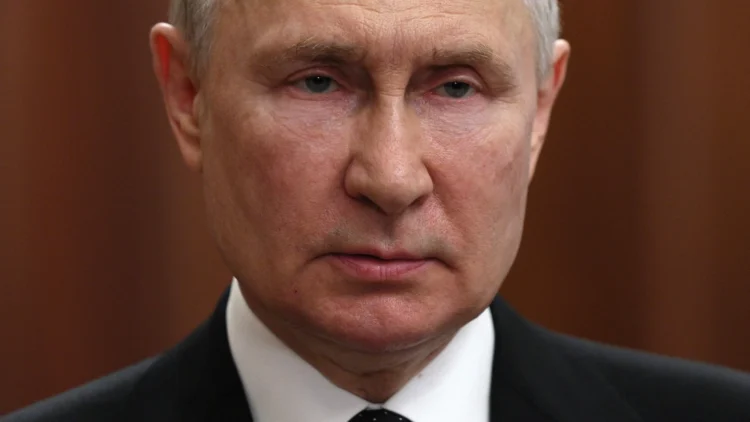By Ben Kerrigan-
Russian President Vladimir Putin was conspicuously absent from the funeral of mercenary chief Yevgeny Prigozhin, following his death in a plane crash, the Kremlin said on Tuesday.
Wagner chief Yevgeny Prigozhin, was buried in a private funeral in St Petersburg.
The mercenary chief was confirmed dead by Russian officials after genetic analysis of 10 bodies found in a crashed plane on 23 August near Moscow.
Prigozhin’s life was abruptly extinguished in a tragic plane crash, a demise that sent shockwaves through Russia and beyond. The Kremlin’s response on Tuesday shed little light on Putin’s absence, leaving room for an undercurrent of intrigue to flourish.
Amid the solemnity that enveloped St. Petersburg, Yevgeny Prigozhin found his final resting place in a private ceremony.
His hometown became both the backdrop and the stage for this quiet farewell, an event that unfolded “in a closed format,” as declared by the Kremlin. The communiqué went on to extend an invitation to those who wished to pay their respects, directing them to the Porokhovskoe cemetery.
The poignant proceedings, however, were punctuated by a conspicuous void. The absence of Vladimir Putin at the funeral of a figure as prominent as Prigozhin, often referred to as the “Wagner chief,” has spurred a barrage of questions and whispers.
As Russia grapples with the loss of a man whose influence extended beyond the borders, speculation looms large.
Prigozhin’s demise, confirmed by Russian officials through meticulous genetic analysis, came as a result of a plane crash near Moscow on August 23. The incident yielded the tragic loss of ten lives, with Prigozhin among those claimed by the catastrophe. The stark reality of his passing, however, has ignited a maelstrom of conjecture and conspiracies.
In the shadow of his death, whispers have grown louder, echoing doubts about the true nature of the plane crash.
The rumors have woven a web of intrigue suggesting that the late mercenary chief might have become a target of political or personal interest. Foremost among these suspicions is the notion that the very hand that shaped Russia’s destiny, that of President Putin, may have been involved.
Allegations of Prigozhin challenging the established norms of Russian militarism have further fuelled these speculations. The late business soldier, known for his multifaceted influence, has been painted as a maverick willing to deviate from the norm and question the status quo. Such a stance, however, is not without its risks, especially in a realm as complex and convoluted as Russia’s.
As the nation contemplates Prigozhin’s legacy, the absence of its leader from his funeral becomes an enigmatic piece of this intricate puzzle. The reasons behind Putin’s absence remain shrouded in uncertainty, leaving room for conjecture to flourish.
In the heart of St. Petersburg, as mourners paid their respects and whispers of conspiracy swirled, the private funeral unfolded—a paradox of public intrigue and private farewells. In a time when answers are elusive and questions abound, the silence left by Vladimir Putin’s absence echoes as loudly as the theories that reverberate through Russia’s collective consciousness.
Prigozhin was a former ally of Putin who had received one of Russia’s top military honours before being labelled a traitor by the president. Putin is reputed for killing individuals that go against his dictatorship regime.
The Kremlin had said on Tuesday that the Russian president would not go to the ceremony commemorating the Wagner leader who launched a mutiny in June that represented the biggest challenge in decades to Putin’s rule.
Pro-Wagner Telegram channels reported that just a few dozen people attended the burial — with no Wagner fighters in attendance
Kremlin spokesman, Dmitry Peskov had earlier declined to say where or when the leader of the Wagner Group would be buried, although some Russian media suggested it could take place as early as Tuesday in Mr Prigozhin’s home city of St Petersburg.
Mr Prigozhin’s top lieutenants, who were also killed in last Wednesday’s crash, are expected to be buried in St Petersburg too. The Kremlin appeared to make sure not to turn Prigozhin’s funeral into a large-scale public show of support for the warlord.
Russia’s top criminal investigation agency, the Investigative Committee, officially confirmed Mr Prigozhin’s death on Sunday.
The committee did not say what might have caused his business jet to plummet from the sky minutes after taking off from Moscow, en route to St Petersburg.
Just before the crash, Mr Prigozhin had returned from a politically high profile trip to West Africa, where he had sought to expand the Wagner Group’s activities. Niger Republiv had recently joined three other, former francophone countries, Guinea, Mali and Burkina Faso as military -led governments.
A preliminary US intelligence assessment concluded that an intentional explosion caused the plane to go down, and Western officials have pointed to a long list of Putin opponents who have been assassinated.
The Kremlin rejected Western allegations that the Russian president was behind the crash as an “absolute lie”. It is not unusual of deaths such as these to be denied by the Russian government.
The crash came two months after Mr Prigozhin presided over a rebellion against the Russian military leadership, leading his mercenaries to take over the military headquarters in the southern city of Rostov-on-Don.
Mr Putin had at the time denounced the revolt as “treason” and vowed to punish its perpetrators but hours later struck a deal that saw Mr Prigozhin ending the mutiny in exchange for amnesty and permission for him and his troops to move to Belarus.
Mr Prigozhin’s second-in-command, Dmitry Utkin, as well as Wagner logistics chief Valery Chekalov, were also killed in the plane crash.




